Expert Interviews
- University Reviews
- Career Guide
 Video Counseling
Video CounselingImportant Facts
- Ask any Question - CV Forum

How to Start a Career in Ethical Hacking in India - Full Career Guide
College Vidya Team Jan 23, 2026 1.1K Reads

While the word “hacker” often stirs in mind the picture of a goggle-eyed person trying to break into data systems and software to access discrete data, there is a branch of hacking which is called “white-hat hacking,” or in simpler terms, ethical hacking. Ethical hacking is a professional domain in cybersecurity where authorized hackers use their skills to identify potential vulnerabilities in organizations’ data systems before an actual malicious hacker can exploit them.
Ethical hacking is a currently growing profession in the light of existing cyber threats and data breaches in the new age of digitization. This is an in-demand domain in a number of industries dealing with sensitive data, including the IT sector, healthcare, banking, and financial services (BFSI), and even government agencies, owing to the nature of sensitive data they often possess. In this blog, we delve deep into the career of ethical hacking and how you can kickstart your own journey of ethical hacking.
Why Choose a Career in Ethical Hacking?
There are a number of merits that this career has to offer. Being a stable and growing domain of the IT and software segment, it offers the opportunity to balance attractive compensation with the ability to contribute directly to others’ well-being through digital means.
Additionally, there are multiple aspects to consider in this domain, which make it an option worth pursuing, and a few of them are mentioned here.
- Skill Gap Alongside Rocketing Demand: As the new roles opening up in sectors like cybersecurity and ethical hacking grow, India faces a major shortage of experienced professionals to occupy them, leading to a significant gap between the rocketing demand for ethical hackers and the skills of IT professionals. This means that with the right training and upskilling, a professional ethical hacker has a humongous scope of opportunities to explore in this field.
- Financially Lucrative Field: While ethical hackers and cybersecurity professionals can expect decently high pay in their starting years (anywhere between INR 5 LPA to INR 7 LPA), the financial upside with due experience and seniority is huge in the field. One can expect to earn as much as INR 63 LPA to INR 65 LPA in senior roles like CISO in this field, making it a highly lucrative domain to explore.
- Opportunity to Contribute to National Digital Security: As the threats of cyberattacks and concerns of digital safety rise, the role of ethical hackers and cybersecurity professionals also grows. In this profession, one gets the chance to contribute directly to the nation’s digital security and well-being.
- Evolving & Dynamic Field: Ethical hacking, alongside cybersecurity, is a domain that is seeing ongoing changes and evolution. New technologies like cloud, IoT, AI, etc., are major disruptive forces changing the very nature of work in ethical hacking, making it dynamic and well-suited for those looking for continuous learning.
- Global Scope of Opportunities: The credentials of certified ethical hackers are globally recognised, thus opening up international avenues for Indian ethical hackers. Moreover, there are numerous industries apart from IT as well who actively hire ethical hackers for safeguarding their digital properties.
- Strong Foundations & Transferrable Skill Sets: Landing a job in ethical hacking requires a person to have a broad range of technical skills and soft skills, which are transferrable, hence widening their scope of opportunities in the IT domain.
Explore the Role: Responsibilities of an Ethical Hacker
A typical profile for an ethical hacker includes responsibilities such as regular penetration testing, vulnerability testing, implementation of security patches, system updates, safeguarding of sensitive data, and so on. The role revolves around upholding the cybersafety of information systems, data systems, and so on. A representation of the core responsibilities of an ethical hacker is presented below.
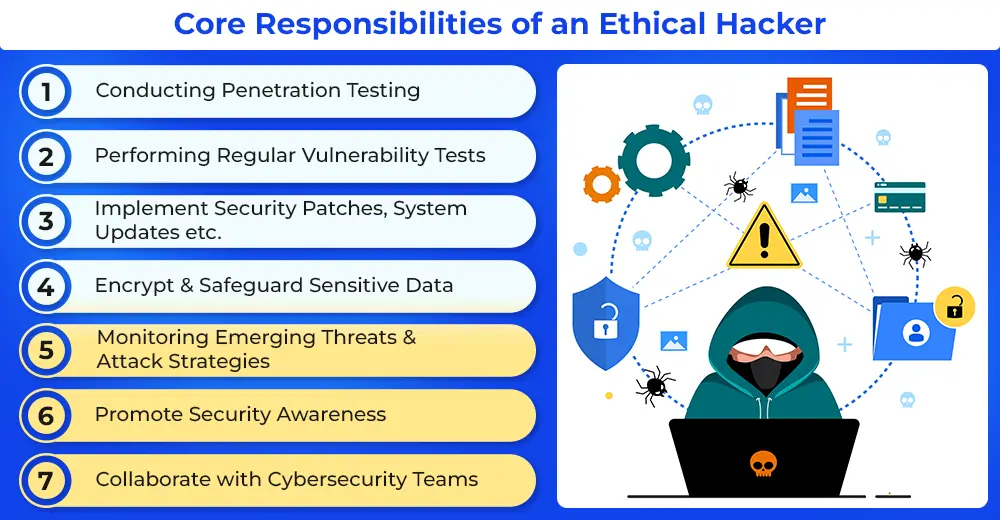
Skill Set for Ethical Hacking
Since the role of an ethical hacker involves both complex technical tasks and security checking, along with an understanding of the discreteness of data, confidentiality, etc., a host of technical skills and soft skills are important to thrive in it. In this section, we explore some of the technical and soft skill areas that you need to strengthen to become a successful ethical hacker in India.
Technical Skills to Succeed as an Ethical Hacker
Technical know-how is at the heart of a cybersecurity role such as ethical hacking, and aspirants looking to establish a career in this domain require proficiency in programming languages, operating systems, penetration testing, tools for penetration testing, and so on. Given below are more details about the important technical skills needed in ethical hacking.
|
Key Skills |
Specifications |
|
Programming & Scripting |
Some of the key programming languages to master: C/C++, Python, Java, PHP, Bash etc. |
|
Cryptography & Encryption |
Key areas to learn about include: encryption algorithms, hashing, digital certificates etc. |
|
Operating Systems |
Proficiency required in operating systems like Parrot OS, Kali Linux, Windows Internals etc. |
|
Penetration Testing & Tools |
Hands-on skills in penetration tools such as: Metasploit, Wireshark, Hydra, Nmap etc. |
|
Web Application Safety |
Knowledge of Vulnerabilities like XSS, Remote Code Execution, SQL Injection, CSRF etc. |
Soft Skills to Succeed as an Ethical Hacker
Soft skills are important for a role like ethical hacking as well, as an ethical hacker must have sound analytical skills, ability to approach problems calmly, strong ethical judgment and integrity (as they are constantly managing sensitive data and discretion is key to the role), along with an aptitude for continuous learning. Described below are a few of the important soft skills to develop if you want to become an ethical hacker.
|
Key Skills |
Specifications |
|
Analytical Thinking & Problem-Solving |
Being well-adept in areas like problem-solving, analysing issues, connecting patterns etc. |
|
Attention to Detail |
Being attentive to minute details like errors, patterns or inconsistencies |
|
Communication Skills |
Effectively converting complex insights into clear, comprehensible and actionable summaries for stakeholders from non-technical backgrounds. |
|
Ethical Judgment & Integrity |
Having a strong professional ethic to handle sensitive data and tasks in a confidential and discrete manner. |
|
Continuous Learning |
Having an orientation of exploring new avenues, staying updated about multiple developments in the field, and being directed towards self-learning |
Career Analysis: Scope of Ethical Hacking
As ethical hacking gains more traction as a mainstream cybersecurity career in India, it is worth exploring its scope in terms of the roles available to pursue in this domain, the compensation of the field, as well as the trajectory of growth one can expect in it. In this section, we look at each of these aspects in detail.
1. Career Opportunities in Ethical Hacking
A number of careers that an ethical hacker can explore overlap with roles in cybersecurity, such as penetration testing, security analysis, security administration, cloud penetration testing etc. The compensation in these roles is quite lucrative from the initial years and has a vast scope of growth with experience. Some of the major roles that an ethical hacker can consider exploring have been listed below with current compensation figures mentioned alongside.
|
Career Option |
Average Salary (Per Annum) |
|
Penetration Tester |
INR 7 LPA |
|
Security Analyst |
INR 11.36 LPA |
|
Cybersecurity Analyst |
INR 6.5 LPA |
|
IT Security Administrator |
INR 6.3 LPA |
|
Chief Information Security Officer (CISO) |
INR 63 LPA |
|
Digital Forensic Analyst |
INR 6 LPA |
|
Threat Intelligence Analyst |
INR 6.5 LPA |
|
Security Consultant |
INR 11.4 LPA |
|
Application Security Engineer |
INR 11 LPA |
|
Cloud Penetration Tester |
INR 7.13 LPA |
The top recruiters for ethical hackers include IT firms, cybersecurity agencies and bodies as well as IT consultancies. Some of the major firms that hire ethical hackers have been illustrated below. One can aim to seek job opportunities as ethical hackers in these firms, which provide fair compensation and scope for career growth.
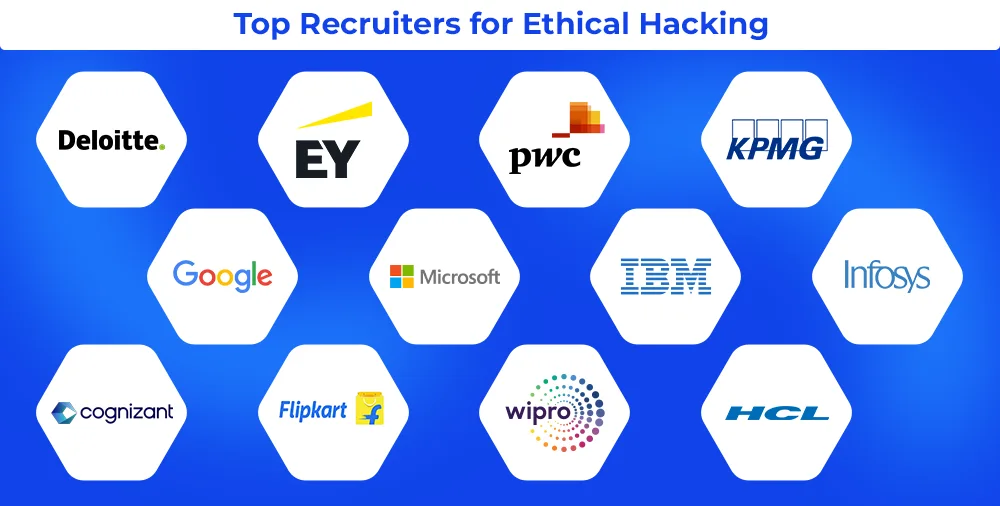
2. Career Growth Trajectory of Ethical Hacking
Ethical hacking offers a steep and attractive scope of financial growth in the current employment landscape. Additionally, since the field is currently transitioning into a mainstream IT career, the compensation figures are also expected to boom for this role. Represented below is the average career trajectory with respect to compensation that one can expect as an ethical hacker. Please note that the graphical representation is based on the current compensation figures as per Indian standards and is liable to change with time.
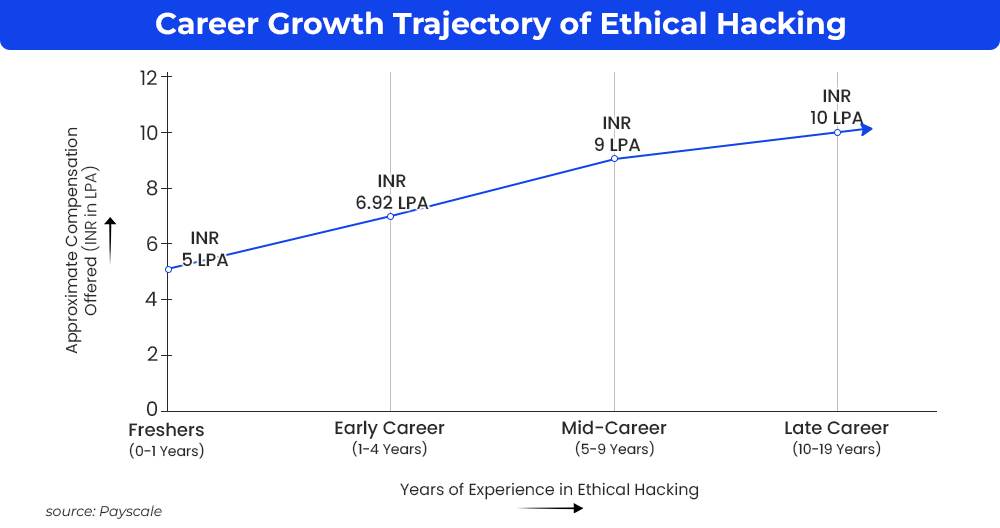
Career Navigator: How to Become an Ethical Hacker?
Strong foundations in IT, technologies like hacking, cybersecurity, penetration testing, etc., are fundamental to exploring this career path. Firms and organisations hiring ethical hackers also require candidates to possess certain formal qualifications. The career trajectory usually includes having a relevant UG degree in technological specialization, along with strong hacking and programming skills. The full career path to follow for becoming an ethical hacker is given below.
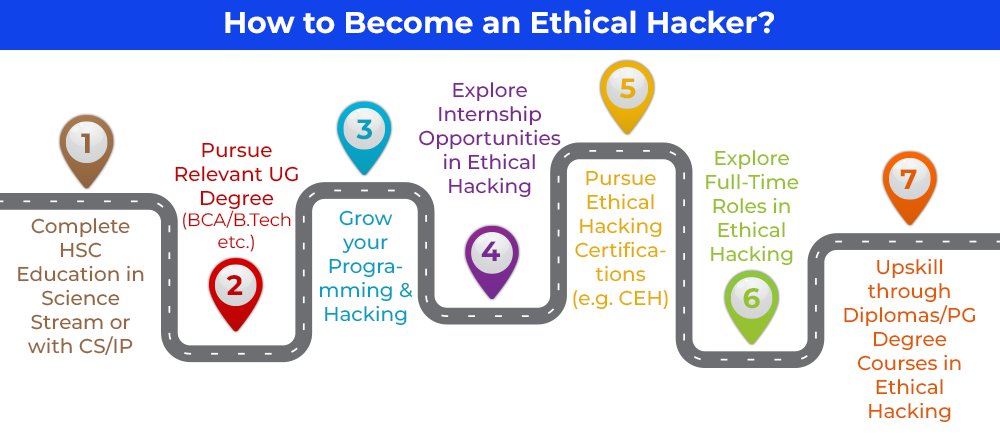
Educational institutions offering courses in ethical hacking provide a range of qualifications that an aspirant can target to achieve. These include UG and PG degrees, PG diploma courses in ethical hacking, as well as professional certifications in ethical hacking, such as CompTIA+, CEH, CISS, etc. To ensure greater accessibility to candidates with diverse requirements, courses in the online and offline modes are available for ethical hacking. A list of the top courses in the UG, PG, and professional levels is provided below for reference.
|
Ethical Hacking Courses |
Approximate Course Fee |
|
ComptTIA Security+ |
INR 40,000 |
|
Certified Ethical Hacker (CEH) Certification |
INR 1,15,000 |
|
Certified Information Systems Security Professional (CISSP) |
INR 66,0000 |
|
Certified Information Security Manager (CISM) |
INR 68,000 |
|
Online BCA in Cybersecurity |
INR 1,50,000 |
|
Online BCA in Cloud Security |
INR 2,00,000 |
|
Online BCA in Cyber Law |
INR 87,000 |
|
B.Tech in Computer Science |
INR 3,00,000 |
|
Online MCA in Cybersecurity |
INR 2,50,000 |
|
Online MCA in Cloud Computing |
INR 2,20,000 |
|
M.Tech in Computer Science |
INR 5,00,000 |
|
Online BCA in Network Security |
INR 87,000 |
The top technical institutions in India, including those like the Indian School of Ethical Hacking, IITs, NITs, etc., offer courses in cybersecurity and ethical hacking, which can provide a robust start to your ethical hacking career. A few such eminent institutions are illustrated below.
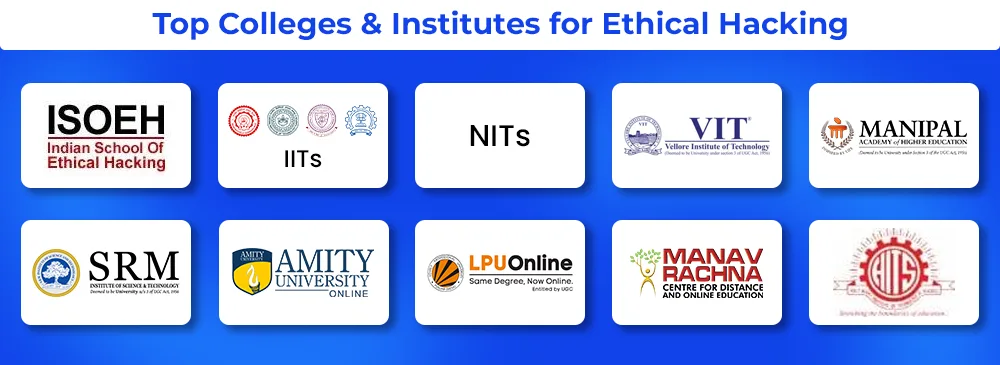
Conclusion
Ethical hacking is a career domain that provides you with the scope to put your technical skills to best use to make meaningful contributions towards safeguarding digital ecosystems. It is a career that is currently transitioning into a mainstream IT role in India, hence providing tremendous future potential for growth.
FAQs (Frequently Asked Questions)
Ethical hacking is an emerging and dynamic career domain in the IT sector in India. It is a well-compensated field that currently has a huge gap in job availability and skilled professionals to occupy the roles. Hence the scope of establishing a successful career in ethical hacking is humongous in India provided you have the right skillset and qualifications. Top companies like Google, Microsoft, IBM etc. hire ethical hackers in their cybersecurity departments.
To become an ethical hacker in India, you must first complete high school education in the science stream (or with subjects like Computer Science/Informatics Practices), followed by a relevant UG degree (BCA/B.Tech in cybersecurity/ethical hacking). After completing your UG education, you can start exploring internship or full-time opportunities in ethical hacking while upskilling through formal certifications such as Certifiied Ethical Hacker (CEH), CompTIA Security+ certificate, Certified Information Systems Security Professional (CISSP) etc.
On an average, an ethical hacker with a few years of experience can earn anywhere between INR 7 LPA to INR 9 LPA. As the seniority level of the professional grows, they can easily earn well above INR 10 LPA and even reach as high packages as INR 50-60 LPA.
Ethical hacking has a wide scope as opposed to common notions. Firstly, ethical hacking requires a range of computing skills along with soft skills which are transferrable and make them eligible for roles in information security, cybersecurity, IT risk consulting etc. Moreover, ethical hacking is emerging as a top area of cybersecurity in the IT sector, and currently has a skill-demand gap, with a lack of trained resources to take up roles. Hence, its scope is huge and prosperous for a professional to explore.
Some common courses at the UG level include BCA (cybersecurity/cyber law/cloud security), B.Tech (Computer Science) etc., at the PG level include MCA (cybersecurity/cloud computing etc.), M.Tech (Computer Science) etc. Certifications relevant to ethical hacking include Certified Ethical Hacker (CEH), Certified Information Systems Security Professional (CISSP), Certified Information Security Manager (CISM) etc.

Idea Alchemist / Concept Creator / Insight Generator
We are an online education platform where users can compare 100+ online universities on 30+ X-factors in just 2 minutes. With an active CV community, we have transformed online learning to quite an extent. With the CV Subsidy scheme, we contributing to GER in India while helping our learners with their finances in their “Chuno Apna Sahi” journey!
Every query is essential.
Our team of experts, or experienced individuals, will answer it within 24 hours.
Recommended for you
Tired of dealing with call centers!
Get a professional advisor for Career!
LIFETIME FREE
Rs.1499(Exclusive offer for today)

Pooja
MBA 7 yrs exp

Sarthak
M.Com 4 yrs exp

Kapil Gupta
MCA 5 yrs exp
or



Career Finder
(Career Suitability Test)
Explore and Find out your Most Suitable Career Path. Get Started with our Career Finder Tool Now!
ROI Calculator
Find out the expected salary, costs, and ROI of your chosen online university with our free calculator.
